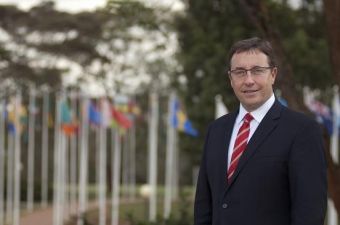UNEP and Brazil launch key mercury project
UN Environment Programme and Brazil's Ministry of Environment launch new research project to help manage environmental risks from mercury

Brazil's Ministry of Environment and the United Nations Environment Programme (UNEP) launched a new research project on Tuesday to help manage environmental health risks from mercury.
The project, Development of Minamata Convention on Mercury - Initial Assessment in Brazil, aims to facilitate the ratification and early implementation of the Minamata Convention by providing key stakeholders in Brazil with the scientific and technical knowledge to protect human health and the environment from emissions and releases of mercury and mercury compounds.
Mercury's impacts on the human nervous system include impaired thyroid and liver function, irritability, tremors, disturbances to vision, memory loss and cardiovascular problems.
Achim Steiner, United Nations Under-Secretary General and UNEP Executive Director: "The Minamata Convention paves the way for greater international cooperation on mercury pollution and global efforts to remove a serious health and environmental threat from the lives of people across the globe.”
Steiner (pictured) added: "Early ratification and implementation of the Convention are crucial to encourage swift action in nations such as Brazil, which sees around 50 tonnes of mercury emitted to the atmosphere each year - not to mention further exposure in areas such as artisanal small-scale gold mining… This joint project will better quantify the emissions to water and land, and allow targeted action to phase out mercury use in line with the convention."
According to the Brazilian Chemical Industry Association (ABIQUIM), Brazil has the world’s seventh largest chemical sector.
Although Brazil has several environmental studies that refer to atmospheric, aquatic, terrestrial and biotic media, most of the data refers to the use of mercury in artisanal and small-scale gold mining only.
Furthermore, Brazil has limited experience in collecting and separately storing mercury and mercury waste, such as that found in lightbulbs.
Brazil consumes annually 300 million bulbs, of which only 16 million are recycled and disposed correctly.
The assessments conducted in the project will take into account how the most vulnerable and excluded populations are particularly affected by mercury releases and will recommend public policies and legislation to protect them.
The project is scheduled to be completed in two years at a total cost of US$2.5 million, of which US$820,000 is provided by the Global Environment Facility (GEF).
Denise Hamu, UNEP's representative in Brazil, said: "The country has indicated that availability of data is a major challenge to design adequate strategies for mercury control and reduction, therefore UNEP's extensive expertise on mercury assessments will facilitate the process to identify the national challenges, needs and opportunities in this sector."
